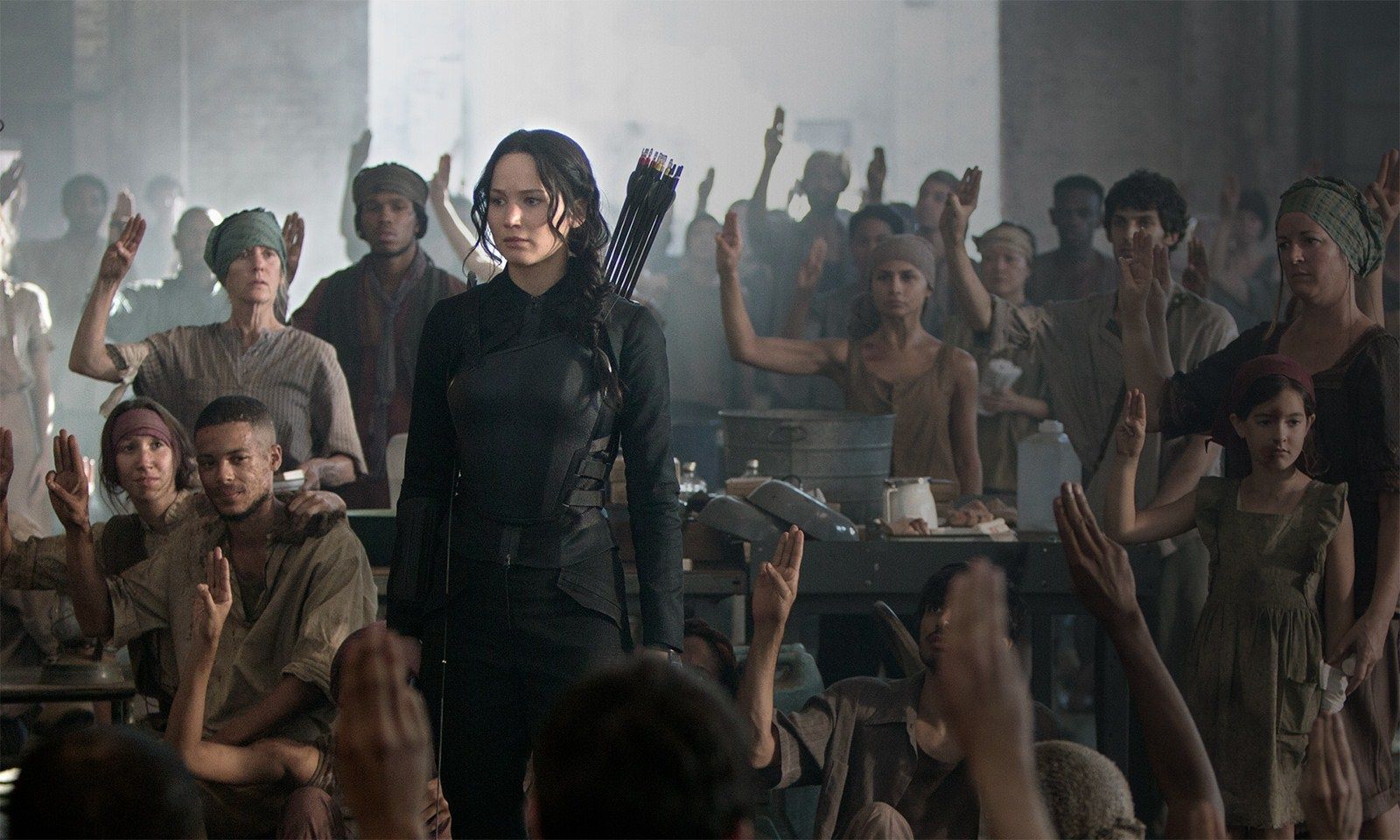It has been some time since The Hunger Games: Mockingjay Part 2 hit theaters in late 2015, and even longer since the third novel in Suzanne Collins’ epic teen-dystopian trilogy released all the way back in 2010.
That said, the Hunger Games fan base has scarcely subsided in their love for the series, and, despite the author’s instance that she will never return to the franchise, plenty of neo-dystopian devotees are still clinging to rumors of a prequel film.
Though intended for a young adult audience, The Hunger Games tackles some pretty dire material: a grizzly, vicious tournament, a civilization of repressed, malnourished peoples, and an authoritarian government which allows it all to happen.
There may be plenty of fans of the story, but there are a scarce few who would actually enjoy living in the world Suzanne Collins has brought to life.
Save for a few ravenous fanatics from the more industrious districts of Panem, who actually volunteer for a chance to compete in the annual Hunger Games, most tributes assume it to be a form of elaborate capital punishment.
In order to keep this unruly, desperate bunch of contestants in line, the Capitol institutes a small set of rules to ensure that the games remain a savage form of entertainment as well as a hostile display of their terrible might over the subservient districts.
The Hunger Games are cruel and barbarous, though tributes who keep these rules in mind may just emerge victorious.
Here are the 15 Rules The Hunger Games' Tributes Are Forced To Obey.
No Formal Training
Though often ignored by Panem’s savage set of districts eager to compete in and champion the Hunger Games, potential tributes aren’t technically allowed to undergo any formal weapons training prior to their arrival in the Capitol.
This rule is rarely enforced and was even broken by the likes of Katniss Everdeen, as well as plenty of the other tributes who gained proficiency in combat via the necessity of their harsh lives.
As anyone who has read the novels or watched the films will attest, life in Panem is exceptionally difficult, and it would be tough to come across anyone lacking in at least some form of survival training.
Plus, Capitol citizens likely wouldn’t find a standoff between 24 battle-green newbies to be all that entertaining.
No False Starts
The Gamemakers — the organization pulling the strings behind the scenes during the games — are diligent in their work to keep the tributes under control.
Going so far as to artificially eliminate contestants caught bending the rules or operating outside of traditional Hunger Games protocol, they can be downright barbaric in the tactics they employ.
With that in mind, their treatment of those seeking a head start in the games shouldn’t be all that surprising: any tribute caught moving so much as a muscle will find their tenure in the games brought to a very swift end by way of a set of land mines embedded around their starting pillar.
The Capitol operates on a zero tolerance policy when it comes to false starts, and tributes caught breaking that rule will be disqualified in gloriously grotesque fashion.
Professional Help From Previous Victors
As previously mentioned, Panem’s governing body prefers its tributes to be relatively new to combat prior to their arrival in the Capitol.
Of course, pitting a set of fresh-faced teens against each other would hardly make for much of a show, so contestants are allowed to receive coaching from previous victors from their district.
While this may be a tremendous help for those hailing from districts rich in Hunger Games championship, it is more or less useless to those originating in areas with a mediocre track record in the games.
This was the case for Katniss and Peeta in the 74th Hunger Games, as they were forced to share a mentor in the relatively unreliable Haymitch Abernathy.
Of course, there must have been a time in which districts boasted absolutely no victors, which would have made for some real problems.
No Mocking The Capitol
Tributes are in no way permitted to partake in any sort of behavior intended to mock the Capitol.
This rule is harshly enforced by Panem’s government, and anyone caught participating in or conspiring with offenders may suffer swift and terrible retribution.
This is a theme present throughout the Hunger Games trilogy, and can first be seen in the Capitol’s reaction to Katniss's’ famous three-fingered salute.
Beyond that, the government’s reaction to her epic refusal to eliminate Peeta at the end of the 74th Hunger Games raught a punishment so Earth-shattering that it shook the nation of Panem to its very core.
Even those thought to be abusing the parameters of the game may face punishment.
Three Square Meals
Food is difficult to come by during the Hunger Games tournament, and it becomes such a vital commodity in the closing days that sending a contestant so much as a loaf of bread can cost beneficiaries a fortune.
That said, the Capitol would prefer that even the most desperate tributes refrain from using their deceased enemies as a source of sustenance.
Grotesque and so macabre as to offend the already demented citizens of the Capitol, the Gamemakers make every effort to ensure that this doesn’t take place within their tournament.
Suzanne Collins’ novels make mention of a contestant partaking in such grizzly affairs who was eliminated in an artificially triggered landslide as a form of retribution for their actions.
Contestants Can Take Tokens and Keepsakes
The Capitol may be pretty brutal, though they aren’t without their small mercies. Despite tossing a group of 24 hapless teenagers into a mortal battle royale, they allow each of their contestants to take one small token from their district into the arena with them.
These are typically some small momentos that may hold some personal value or remind a contestant of all of their supporters rooting for them in their home districts.
Of course, these are never intended to provide an undue advantage, and tokens are strictly intended to be non-lethal.
There are references in the books and movies to previous Hunger Games tributes attempting to sneak in lethal substances via their keepsakes, though it can be assumed that the Gamemakers quickly dealt with them.
No Fighting In Private
As previously stated, tributes may being official-sanctioned weapons and survival training when they reach the Capitol, though many of them will already have extensive experience in both by the time their names are drawn during the Reaping.
Unfortunately, though, it can be assumed that born-and-bred tributes from districts successful in the Hunger Games have sparred against each other relentlessly, no two contestants are not allowed to fight against each other in private prior to their introduction to the arena.
Naturally, these rules don’t prevent such things from happening, but, if anything, the games could be made more interesting if contestants aren’t intimately familiar with each others unique skill sets.
There Can Only Be One Victor
There aren’t all that many hard-and-fast rules when it comes to the Hunger Games. Many underhanded methods or outright disrespectful tactics will be punished by the Gamemakers, but they aren’t exactly blatantly condoned.
That said, one of the very few strictly-stated rules is that there can only ever be one victor each year.
Though the odds may ever be in your favor, they aren’t exactly good, and they were even worse of Haymitch, who participated in a Quarter Quell in which the tribute number was doubled.
This law was famously violated in the 74th Hunger Games by Katniss and Peeta, which set in motion a set of events that would forever change the country of Panem.
Airdrops Are Allowed
The Hunger Games may be a relatively even playing field on the surface, but, like in all things, those with wealth tend to have an upper hand.
Beneficiaries have the option to send food, weapons, and survival gear to contestants in the arena, the caveat being that, the longer the games go, the more expensive such support becomes.
While sending any sort of care package is comparatively inexpensive early on, the longer things go, the more expensive it becomes.
Though sending medical supplies may be doable on the first day, a simple loaf of bread may become infeasible as the days wear on.
By that logic, it would seems that those hailing from the more affluent districts might be able to prop up their tributes more effectively.
Training Scores Are Everything
As was prominently featured in the first acts of both the first novel and movie in the Hunger Games series, tributes are, at the end of their training cycles, allotted an audience with the Gamemakers to display their skills.
These powerful Hunger Games puppeteers then rank all 24 tributes on a scale between one and twelve — one being the lowest, and twelve being the highest — based on their likelihood to emerge victorious from the arena.
Both Katniss and Peeta were famously awarded the highest possible score during the lead up to the 74th Hunger Games, and it has been said that a tribute once won despite earning a score as low as a three.
Fashion Shows Are Mandatory
A defining moment of the entire Hunger Games trilogy, Katniss Everdeen was given her quite literally awe-inspiring “Girl on Fire” title as the result of an event in which all tributes are forced to partake prior to the games.
Similar to a real-world red carpet ceremony, each pair of tributes from all twelve districts are dressed ornately and paraded around before the Capitol in a faintly sinister display.
Each of the candidates flaunt their stuff and are later interviewed on national television.
From here, audience members and Gamemakers alike begin to pick favorites, and the seeds of that year's Hunger Games are slowly sewn.
Analogous to the first preseason game of any professional sport, it is a tribute’s first chance to make their mark on the world before the games officially begin.
The Victor Gets A Tour Of All 12 Districts
After the year’s games are all said and done, the winner ("survivor" may be a more appropriate term) is taken on a victory tour of all twelve districts, arriving at their home district last.
Though this may sound like a time for celebration, the novels and movies seem to portray it as a very grim occurrence.
Though that year’s grizzly affair is over, the victory lap, for many, serves as little more than a reminder of the Capitol’s absolute power.
A victor’s presence in a foreign district likely reminds that district’s inhabitants in his or her hand in ending the lives of their own tributes, and it is a, in most cases, a cause for solemnity.
Had Panem’s tyrannical government overplayed their hand in this matter, they could perhaps have quelled a rebellion before it ever got started.
Play By the Rules
Though apparently unwritten, it seems like the Gamemakers aren’t too keen on allowing tributes to eliminate other contestants through unsanctioned means.
Despite requiring a great amount of intelligence and craft to be successful, the Hunger Games are almost always won by those who chose to stick to the rules.
Haymitch relays this; during his time in the 50th Hunger Games, he eliminated some of his enemies via the exploitation of the arena’s barriers.
This brought the swift and awful retribution of the Capitol upon his family, the aftermath of which was horrible enough to force him into his sloven, nihilistic ways.
Again, while a series mostly intended for young adults, The Hunger Games can be starkly emotional.
Feasts are Mandatory
Food and supplies tend to become scarce as the end of the games draws near, and, as a result, the remaining tributes tend to become reclusive, often opting to hide and hunt for food instead of pursue each other.
That is, aside from the war-pruned volunteer tributes, who often relentlessly hunt down their peers.
Should the games stagnate too much for the Capitol's liking, the Gamemakers will hold a “feast” of sorts, drawing the remaining contestants back to the cornucopia by way of renewed supplies.
Katniss notes that this is often a total farce, and previous contestants sometimes did battle over little more than a stale piece of bread. Though not and out-and-out rule, it is an expected occurrence.
Stay Alive
This is, in the words of Haymitch Abernathy, the only real rule of the Hunger Games.
This may sound a bit cynical coming from the man who resorted to extremely desperate and rule-bending methods to come out on top of the 50th Hunger Games, but Panem is a place which tends to favor cynics.
Officially stated rules are few and far between when it comes to the Hunger Games, and officially enforced rules are even fewer.
That said, all tributes can truly do is play by the rules and hope to entertain the masses enough to avoid artificial elimination at the hand of a set of disinterested Gamemakers.
A cruel tournament, Panem’s governing body may force participation and encourage involvement, but the odds are hardly ever in your favor.
---
Can you think of any other rules the tributes of The Hunger Games are forced to obey? Let us know in the comments!
















